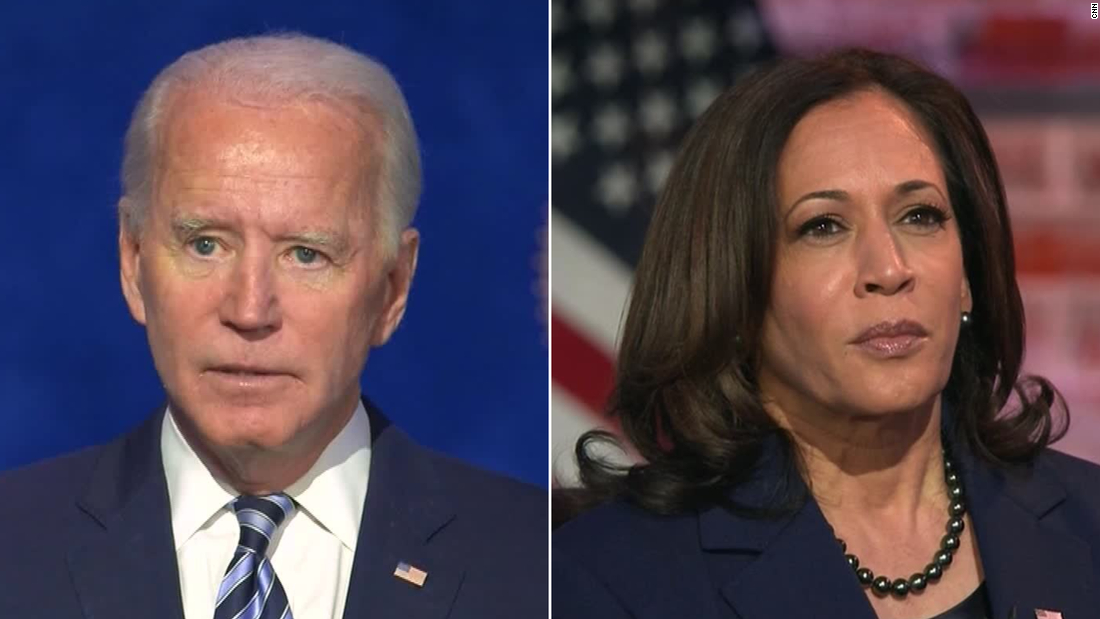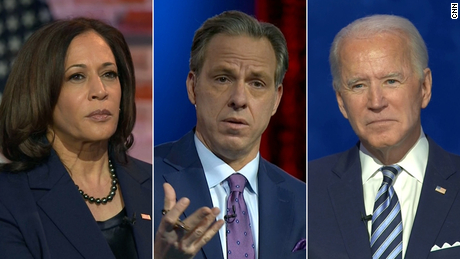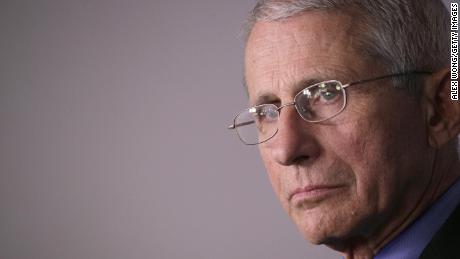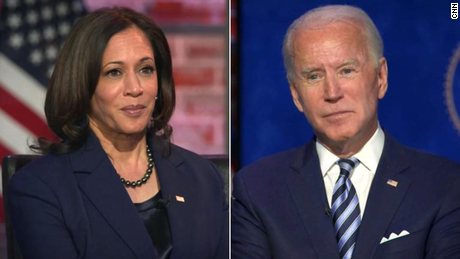The President-elect announced an effective promotion for Dr. Fauci, who Trump has marginalized and insulted
Ever since President Franklin Roosevelt took office in the dark days of the Great Depression in 1933, the first 100 days have marked the apex of a new US leader’s power and often the most prolific period for policy wins.
During the interview Thursday, Biden referenced the steep challenges Roosevelt confronted when he was first elected, noting that the current circumstances are “not unlike what happened in 1932.”
“There was a fundamental change, not only taking place here in the United States, but around the world,” Biden told Tapper. “We’re in the middle of this fourth industrial revolution,” he noted. With all the changes in technology, he said, Americans are wondering, “Will there be a middle class? What will people be doing? … There’s genuine, genuine anxiety.”
FDR told Americans in his first inaugural address that “the only thing we have to fear, is fear itself,” steeling a demoralized citizenry to hold firm amid a banking crisis that threatened to destroy an already devastated economy.
Biden will take office amid the most extreme domestic circumstances of any president since Roosevelt, with sickness and death rampant and millions of Americans unemployed, hungry or at risk of losing their homes.
Like his Democratic forbear, he will use the iconic opening moments of his term to summon an exhausted people to unite, in common cause — with the help of new vaccines — this time to beat the virus and save the economy.
There is a question, however, whether Biden’s calls for national unity will resonate among people who didn’t vote for him after Trump’s relentless attacks on the legitimacy of his victory in the presidential election. But Biden’s call to action may carry greater urgency now that the virus is taking hold in rural areas of the heartland with comparatively rudimentary health care systems, which escaped the first wave of infection that concentrated in many cities that tend to vote for Democrats.
Biden’s interview — his first since the election that also included Harris — underscored a complete course correction from Trump’s attitude towards the virus. The pandemic has never been worse than it is now in the United States. One American is dying every 30 seconds amid record fatality figures and hospitalizations. Doctors and nurses are exhausted after months inside overflowing under-resourced Covid wards.
More than 276,000 people have now died from coronavirus in the United States and the nation set a new record for hospitalizations on Thursday with more than 100,667 people being treated for Covid-19.
Yet the current President is ignoring the carnage, as he pursues his fantastical lies and claims the election that he lost by a comfortable margin was stolen.
Trump has frequently mocked the wearing of masks. He is holding holiday parties inside the White House in defiance of his own government’s health recommendations. When he returned home after his bout in military hospital with Covid-19 he famously turned to the cameras and ripped off his mask.
By contrast, and if past behavior is any guide, it is conceivable that one of Biden’s first acts after delivering his inaugural address in 47 days will be to put his mask back on.
Biden asks Fauci to stay in his current role
In another sign of a fresh approach to the pandemic, Biden said in the interview he had asked Dr. Anthony Fauci, who Trump has marginalized and insulted, to continue his current role as the nation’s top infectious diseases specialist in Biden’s administration and announced an effective promotion for the globally respected expert. Fauci told NBC on Friday that he immediately accepted.
“I asked him to stay on the exact same role he’s had for the past several presidents, and I asked him to be a chief medical adviser for me as well, and be part of the Covid team,” Biden told Tapper, in a gesture that implies a return to continuity and science based policy-making after Trump’s wild presidency.
Biden emphasized that he and Fauci spoke about the fact that “you don’t have to close down the economy” if Americans are following through with other safety protocols to prevent the spread of the virus. And he noted that even before they spoke, Fauci has been speaking regularly with Ron Klain, Biden’s incoming chief of staff, and the two forged a close working relationship during the Ebola outbreak. The President-elect also said during the interview that he would get the vaccine publicly to show the public his confidence in it.
“When Dr. Fauci says we have a vaccine that is safe, that’s the moment in which I will stand before the public and say that,” Biden said. People have lost faith in the ability of the vaccine to work. Already the numbers are really staggeringly low, and it matters what the president and vice president do.”
Earlier this week, former Presidents Bill Clinton, George W. Bush and Barack Obama all pledged to get the vaccine in public view to help combat vaccine skepticism. Biden said his three predecessors “have set the model as to what should be done.”
Aid to states and struggling Americans
The President-elect said it is already clear to him from his conversations with governors across the country, as well as 50 Democratic and Republican mayors, that they will need a significant amount of money to get the vaccine where it needs to go.
“It’s one thing to get the vaccine delivered — in cases, some frozen, some not — and another thing to get the vaccine to move from the case to a vaccination in someone’s arm. That’s the really complicated piece,” Biden said, noting that governors and mayors told him they need far more financial assistance to get the vaccine delivered, which he described as “an incredibly expensive proposition.”
“That’s why we’re continuing to hope that the Senate does something and responds to the immediate need to provide dollars. But we’re going to need a lot more” once in office, Biden said. “It’s going to cost literally billions of dollars to get this done. We can keep schools open. We can keep businesses open. But you have to be able to get the vaccine distributed.”
The President-elect noted that the Trump administration has been “cooperating with us of late” and looping them in on the plans for how they are going to deliver on the vaccine, but he said, “There’s not any help getting out there.”
“Look at all the businesses that are being hurt so badly,” he said. “No money to help them. Come Christmas time, there’s going to be millions of people see their unemployment run out. So, there’s a whole range of things that have to be done.”
Biden called the $900 billion framework for a congressional aid package proposed by a bipartisan group of members “a good start,” but said more aid would be needed and he urged members to focus on what struggling Americans need most.
“What’s immediately needed is relief for people in their unemployment checks; relief for people who are going to get thrown out of their apartments after Christmas because they can’t afford to pay the rent anymore; relief on mortgage payments; relief on all the things that are in the original bill the House passed,” Biden said. “People are really hurting. They’re scared to death.”
Biden’s diametrically different Covid strategy, particularly his call for Americans to mask up in the first 100 days, is already being welcomed by medical experts who are watching in horror as daily Covid deaths soar over 2,500 per day even before the feared escalation in infections following Thanksgiving travel.
“President-elect Biden, and his leadership and listening to scientists, believe that if we all wore our masks for 100 days, we would have a significant reduction in the transmission of the virus,” said Rick Bright, a former Trump administration vaccine expert who resigned after warning the administration ignored warnings about the early spread of Covid-19.
“The science shows that wearing a face mask reduces the spread. I think it would have a huge impact,” Bright, who now sits on Biden’s coronavirus advisory board, told CNN’s Wolf Blitzer.
Biden says Harris will be a full partner
Since the first day Biden asked her to join him on the ticket, she said he has been “very clear with me that he wants me to be the first and the last in the room” on major decisions. “So on every issue that impacts the American people, I will be a full partner to the President-elect and the President.”
She mirrored Biden’s position, for example, on how the administration would treat any potential investigations into Trump’s conduct after he leaves office, even though it is different than the tone she used toward Trump during her campaign.
Biden told Tapper that his Justice Department will operate independently, and that he would not direct them on how or who to investigate: “I’m not going to be saying go prosecute A, B or C — I’m not going to be telling them,” Biden said. “That’s not the role, it’s not my Justice Department it’s the people’s Justice Department.”
Harris, a former prosecutor who served as California’s attorney general, echoed that call for independence for the Justice Department, drawing a bright line between the Biden administration’s approach and Trump’s.
“We will not tell the Justice Department how to do its job. And we are going to assume, and I say this as a former attorney general elected in California — and I ran the second largest Department of Justice in the United States — that any decision coming out of the Justice Department, in particular the United States Department of Justice, should be based on facts, it should be based on the law, it should not be influenced by politics, period,” Harris told Tapper.
When Tapper asked Harris what her portfolio would be as vice president — whether she would head a Covid-19 task force, for example, as Vice President Mike Pence has — Biden interrupted to say he would answer the question. He said he planned to enlist Harris on whatever the most urgent need was at a given moment, much as he did for President Barack Obama as vice president.
“Whatever the most urgent need is that I’m not able to attend to, I have confidence in turning to her,” Biden said, noting that was dissimilar from former Vice President Al Gore’s approach, which was to handle an entire issue portfolio like the environment. “Look, there’s not a single decision I’ve made yet about personnel or about how to proceed that I haven’t discussed it with Kamala first.”
![]()










